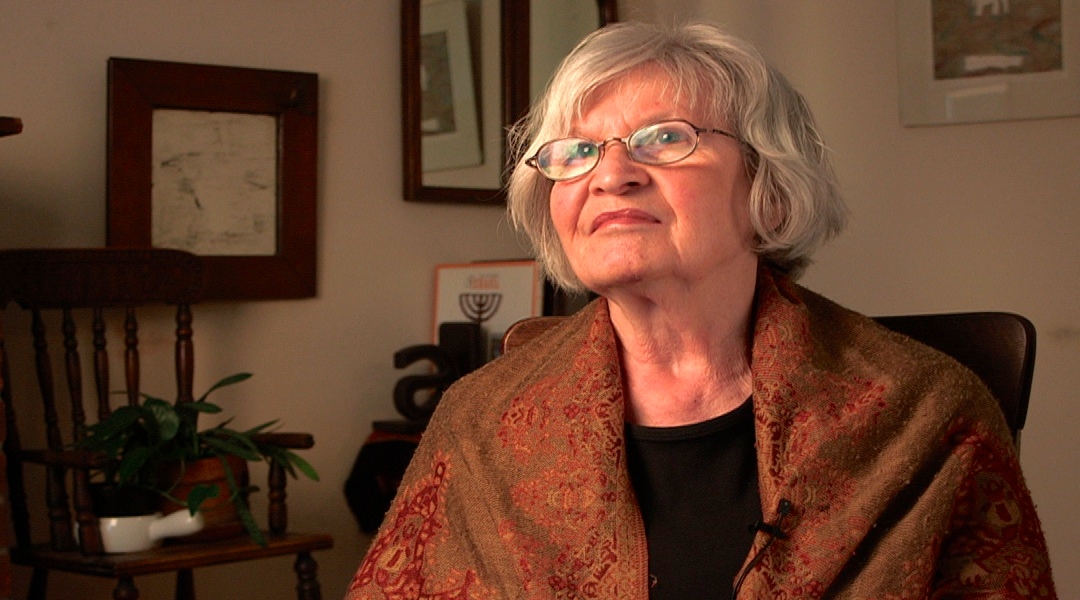Frieda Johles Forman, ‘fiery’ feminist who rediscovered Yiddish women authors, dies at 87
“She was a feisty, brilliant and extraordinary woman,” recalled a colleague

Frieda Johles Forman, feminist translator, editor and writer, sits for an oral history interview with the Yiddish Book Center, May 11, 2016, in Toronto. (Yiddish Book Center)
Although Frieda Johles Forman grew up speaking Yiddish in Europe and New York City, it was not until she moved to Canada as an adult that she became familiar with great women Yiddish writers.
Riding the bus in Toronto, she told the Yiddish Book Center in an oral history, Forman would pass through Jewish neighborhoods where “there were a lot of survivors, and they spoke Yiddish. So I would ride on this bus and hear Yiddish and I was very — I longed for it.” At her daughter’s suggestion, she decided to take a month-long seminar on Yiddish at the University of Oxford, which inspired a search for women writers that would ultimately turn into a groundbreaking collection of Yiddish prose fiction by women.
“I was a fabrente feminist,” Forman, using the Yiddish word for “fiery,” told a doctoral student who interviewed her last year. “Which stories represent the greatest history for Yiddish women or Jewish women? In other words, which stories were the most revealing?”
Forman, a trailblazer of feminist Jewish studies, died June 9 at Toronto General Hospital. She was 87.
The book she edited and translated, “Found Treasures: Stories By Yiddish Women Writers,” was the first anthology of its kind when it was published in 1994, featuring 18 writers whose writing was previously available only in Yiddish.
“‘Found Treasures’ reinvigorated the impulse to highlight Yiddish women writers’ literary voices,” wrote Julie Sharff, the student who interviewed Forman last year for the journal In geveb. Until its publication, Yiddish women writers were often dismissed as mere “poets” — inconsequential ones at that — who had not created a worthwhile body of important prose. “’Found Treasures’ is evidence against these two charges, and all the while focuses on narratives that put women’s experiences first,” Sharff wrote.
Forman was working at a research center at the University of Toronto, she told Sharff, when “I began to see the whole world through feminist eyes, but also Yiddish — they were partners.” At England’s Oxford Centre for Hebrew & Jewish Studies, she began researching Yiddish women writers of prose, and a mentor urged her to comb through the eight-volume “Biographical Dictionary of Modern Jewish Literature,” known in Yiddish as the “Leksikon,” for names.
Forman gathered a collective of women Yiddish scholars who discovered in archives and old libraries forgotten works by writers like Rokhl Brokhes, Fradel Shtock and Rikudah Potash, and translated them for what became “Found Voices.”
Forman also taught the first-ever women’s studies course at the Ontario College of Art (before it became OCAD University), and founded the first interdisciplinary feminist art conference there in 1971.
She founded, and for two decades directed, the Women’s Educational Resource Centre at the Ontario Institute for Studies in Education at the University of Toronto. She also founded Kids Can Press, a Canadian-owned publisher of children’s books.
“I worked with her at the Women’s Educational Resource Centre for 10 years and she informally advised me on my doctoral work in feminist art education — which, thanks to her inspiration, I was able to realize as one of the first of two arts-informed research dissertations at OISE,” said Pam Patterson, an assistant professor at OCAD, in a statement. “She was a feisty, brilliant and extraordinary woman.”
Forman’s books included “The Exile Book of Yiddish Women Writers” (2013), “Taking Our Time: Feminist Perspectives on Temporality” (1989) and “Jewish Refugees in Switzerland During the Holocaust: A Memoir of Childhood and History” (1994).
Frieda Johles Forman was born in Vienna in 1937 into a Yiddish-speaking, Orthodox family. During the war, she and her family fled to Toulouse and eventually to Switzerland on what she called “the last train out of Belgium to France.” After the war, she and her parents migrated to the Boston area where she attended the “Boston Yeshivah” of Rabbi Joseph B. Soloveitchik, Girls’ Latin School and Hebrew College.
She earned a master’s degree in philosophy after moving to New York and studying at City College and taught Hebrew and Jewish studies.
In the late 1960s she and her husband moved to Canada and she took a job at the Ontario College of Art. In addition to her research and writing, she led workshops in Yiddish literature at the Centre for Women’s Studies, what is now called the Workers Circle and at New York’s B’nai Jeshurun congregation.
Asked what kind of students were drawn to her books and classes, Forman replied, “different generations have been attracted to Yiddish. You can’t just say its [only] people who do it for sentimental reasons, they remember their grandmother, ‘di bobe [grandmother] Esther Zemmel.’ I’ve read a lot of people writing about what it meant to them to study Yiddish. And they say how wonderful it felt to be in a class. And to see these words and to hear them, because Yiddish is a very auditory language. It sounds good.”
Her survivors include two children and four grandchildren.
This article originally appeared on JTA.org.
A message from our CEO & publisher Rachel Fishman Feddersen
I hope you appreciated this article. Before you go, I’d like to ask you to please support the Forward’s award-winning, nonprofit journalism during this critical time.
We’ve set a goal to raise $260,000 by December 31. That’s an ambitious goal, but one that will give us the resources we need to invest in the high quality news, opinion, analysis and cultural coverage that isn’t available anywhere else.
If you feel inspired to make an impact, now is the time to give something back. Join us as a member at your most generous level.
— Rachel Fishman Feddersen, Publisher and CEO